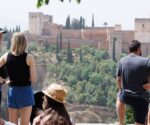British tourists in Italian hotspot told ‘do not do this’ or face £2,558 fines | Europe | Travel
Italy is still one of the most popular destinations for British holidaymakers looking for sun, culture and great food. A perennial favourite for travellers right across the globe, the art-obsessed country draws in millions of visitors every year.
Last year saw a whopping 64.5 million people descend on Italy, according to Global Asset solutions. Italy is blessed with some 450 islands, the two largest which are Sicily and Sardinia. Sardinia is one of the top destinations for Brits travelling to Italy, attracting over half-a-million in 2023 alone.
And it is easy to see why so many would want to go and spend time on the island that is surrounded by the Mediterranean Sea.
The island boasts pristine sandy beaches, crystal-clear waters, a diverse landscape and a unique and delicious cuisine.
It also offers a treasure trove of Bronze Age sites and artefacts uncovered by archaeological excavations.
The rugged landscape is dotted with thousands of nuraghi – mysterious Bronze Age stone ruins shaped like beehives.
One of the largest and oldest nuraghi is Su Nuraxi in Barumini, dating to 1500 B.C.
However, visitors should be careful not to fall foul of a local law that could lead to huge fines for those unlucky enough to get caught out.
Taking shells or pebbles from any beach on the island is strictly forbidden and punishable by a fine of up to €3,000 (£2,558).
Sardinia’s local authorities are cracking down hard and airport staff have the authority to search luggage.
The ban on taking shells and pebbles is intended to protect the fragile coastal ecosystem and prevent the erosion of its beaches.
These items play a crucial role in maintaining the shoreline and removing them, even in small quantities, can have significant long-term ecological consequences.
The shells provide habitat for various organisms and contribute to the overall health of the coastal environment.









